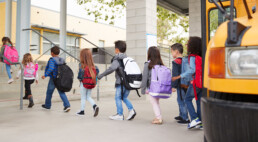Fun and Engaging Activities for March Break with Your Kids
March Break is a much-anticipated time for kids to relax and have fun, and take a break from their hectic school schedules. For parents, it can be a challenge to keep them entertained and engaged without resorting to just screen time. Whether you’re looking to explore the great outdoors, enjoy educational activities, or simply have some creative fun at home, there are plenty of ways to make the most of the break. Here are some fantastic ideas to keep your kids busy and happy during March Break!
1. Outdoor Adventures

Spring is just around the corner, and March Break is the perfect time to get outside and enjoy the fresh air after being cooped up all winter.
- Go for a nature hike: Visit a local trail or conservation area and explore the beauty of nature. Be sure to dress for the weather and be cautious of slippery trails and melting conditions.
- Visit a zoo or farm: Kids love seeing and learning about animals, making this both fun and educational. Many local farms are offering special March break activities.
- Visit a sugar shack. In many parts of Canada, it is Maple Syrup season and March break offers the perfect excuse to go enjoy some sweet treats celebrating a classic Canadian tradition.
- Go on a scavenger hunt: Create a list of items to find in the park or backyard and make it into a game. You can pair this with a nature hike to add a bit of interactivity to your walk.
- Try geocaching: This modern-day treasure hunt is a great way to keep kids active and engaged.
2. Indoor Fun and Creative Activities

If the weather isn’t ideal, there are plenty of indoor activities to keep kids entertained.
- Arts and crafts day: Set up a crafting station with paints, markers, and recycled materials for DIY projects. There are numerous online videos where they can follow along to create an artistic masterpiece or just go full Jackson Pollock in your kitchen.
- DIY science experiments: Simple experiments like making a volcano with baking soda and vinegar can be both fun and educational. Making homemade slime is always a crowd pleaser, or search online for a host of fun, simple experiments you can do with household items.
- Baking together: Get kids involved in the kitchen by baking cookies or cupcakes and decorating them creatively. Then of course, enjoy the fruits of your labour.
- Movie or game night: Pick a family-friendly movie or have a board game marathon for a cozy evening at home.
3. Educational and Enriching Activities

Keep kids’ minds active with these educational experiences.
- Visit a museum, art gallery or science center: Many offer special March Break programming designed for kids. Prepare yourself for these locations being busier than normal and be sure to pack extra snacks.
- Go to the library: Check out story time sessions or let kids pick out new books to read. For older kids, choose a book to read together and discuss.
- Learn a new skill or hobby: Encourage kids to try something new like photography, coding, or a musical instrument. The internet is your friend here with many options for tutorials aimed at different ages and skill levels.
- Virtual field trips: Many museums and attractions offer online tours that can be explored right from home.
4. Active and Sports Activities

Keeping kids physically active is important, especially during a break from school where they miss out on their daily recess activities and gym classes.
- Go skating or swimming: Many community centers have special March Break schedules.
- Try indoor rock climbing or trampoline parks: These are great ways for kids to burn off energy while you sit and enjoy a coffee. Or, do some stretches and join in on the fun.
- Have a dance party: Put on some fun music and have a dance-off in the living room. Give them a taste of your sophisticated 90s pop music taste.
- Take in one last moment of winter with skiing or snow tubing: If weather permits visit your local ski hill for some fun on the slopes.
5. Day Trips and Special Outings

If you have a little extra time, a short trip can make March Break even more memorable. It is often novel experiences that kids remember and a quick road trip to a special spot can become a lasting memory .
- Visit an amusement park or indoor playground: Many have special events planned for March Break.
- Explore a new city or town: A day trip to a nearby destination can feel like an adventure.
- Check out a live performance: Look for family-friendly plays, puppet shows, or concerts.
- Go to an aquarium: A fascinating way for kids to learn about marine life up close.
Final Thoughts
March Break is a great opportunity to bond as a family and create lasting memories. Whether you choose outdoor excursions, creative projects, or educational experiences, the key is to keep things fun and engaging. With a little planning, you can turn this break into an exciting and enriching time for your kids.
Navigating Winter Roads: A Guide to Teen Drivers for Safe and Sound Travels
The thrill of earning your driver's license is a rite of passage, but with winter's icy embrace comes a new set of challenges on the road. As a new teen driver, it's important to equip yourself with the knowledge and supplies to conquer winter driving safely. In this article, we'll delve into essential tips for navigating winter roads and the must-have supplies to keep in your car.
Safety Tips for Winter Driving
1. Slow and Steady Wins the Race: Reduce your speed and maintain a safe following distance. Slower speeds give you more time to react to unexpected situations.

2. Mind the Ice: Be particularly cautious on icy patches, bridges, and overpasses. These areas tend to freeze first and can catch even experienced drivers off-guard.

3. Smooth Movements: Avoid sudden acceleration, braking, or steering. Smooth, gradual movements help maintain control on slippery surfaces.
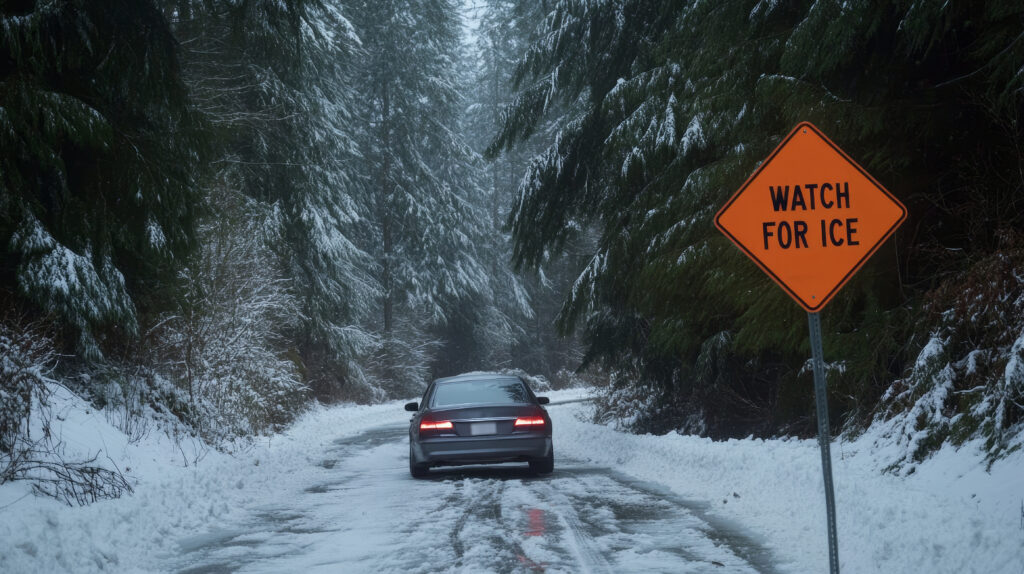
4. Use Your Lights: Turn on your headlights even during the day, especially in low visibility conditions. It helps other drivers see you better.

5. Know Your Brakes: Learn how to use your vehicle's anti-lock brakes (ABS) if equipped. Apply firm, continuous pressure and let the ABS do its job.

6. Don't Rely on All-Wheel Drive: While all-wheel drive can provide better traction, it doesn't guarantee invincibility on icy roads. Drive cautiously regardless of your vehicle's capabilities.

7. Ensure Vehicle is Maintained: Keep up to date on oil changes, ensure battery is functioning properly, swap out old windshield wipers and perform regular tune ups.

8. Check Tire Pressure Regularly: This will ensure optimal handling as well as improve gas mileage.

9. Keep Gas Tank Full: Avoid driving around on less than a quarter tank of fuel. You never know when an accident will result in heavy traffic or road closures leading to you running out of fuel in bad weather without gas stations nearby.

10. Plan Ahead: Check weather forecasts and road conditions before leaving. If conditions are unsafe, consider delaying your trip. Be sure to check weather conditions for when you're departing your destination to come back home as well. It might look perfectly clear in the moment, but conditions can quickly deteriorate when you're planning on driving home.

11. Communication: Let someone know your route and estimated arrival time, especially if you're driving in challenging conditions.
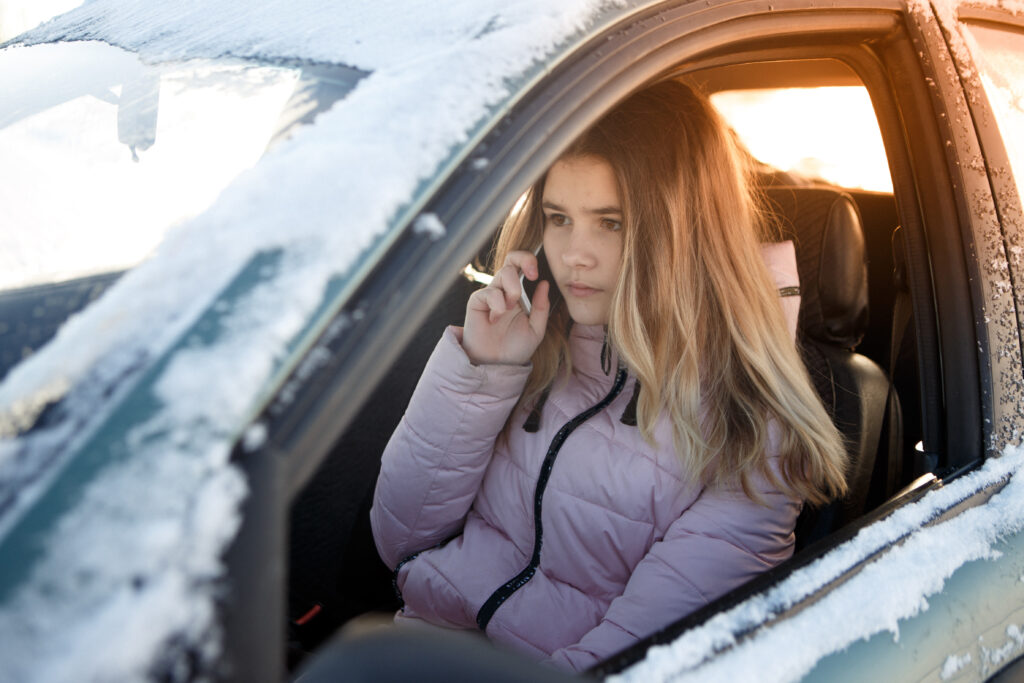
12. Stay Calm: If you skid, stay calm and steer in the direction you want to go. Avoid over-correcting, which can make things worse.

Essential Supplies for Winter Driving
1. Ice Scraper and Snow Brush: Clear your windows, mirrors, and roof from snow and ice before hitting the road for optimal visibility.
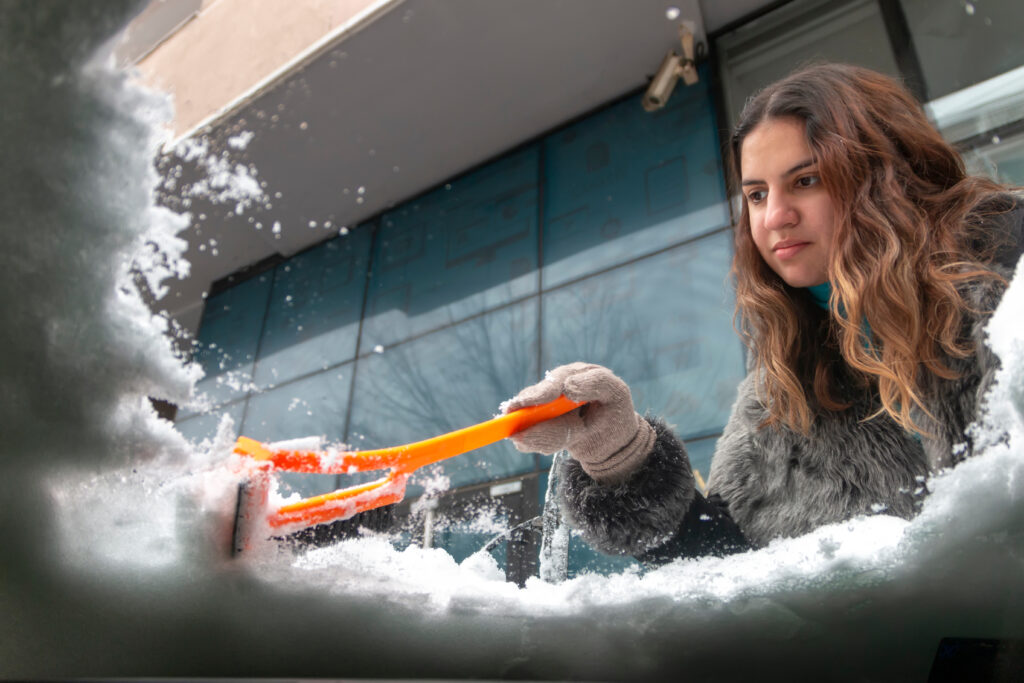
2. Winter Tires: If you live in an area with heavy snowfall, consider investing in winter tires for improved traction.

3. Emergency Kit: Prepare a kit containing essentials like blankets, gloves, a flashlight, a first aid kit, non-perishable snacks, and water.
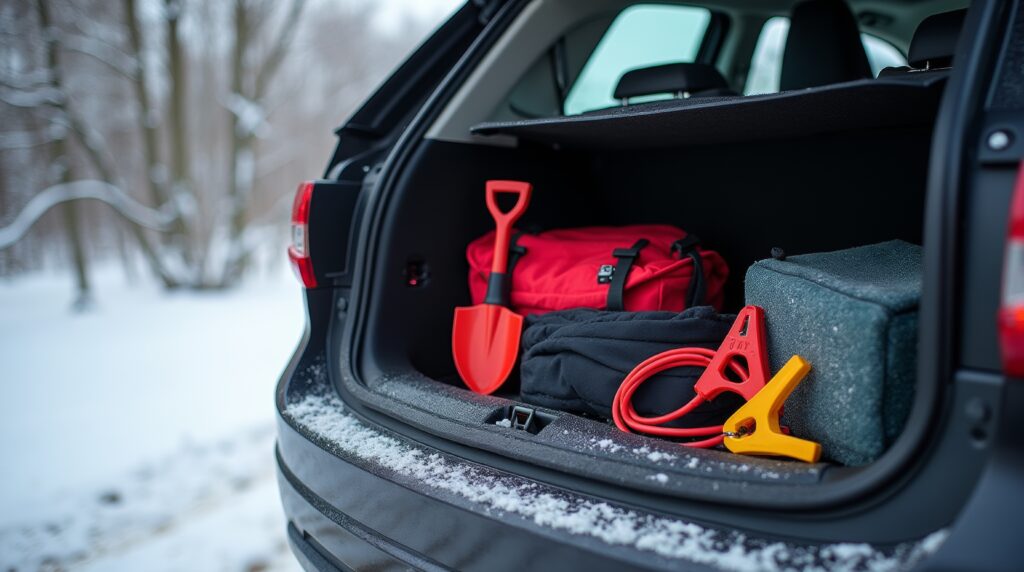
4. Jumper Cables: Cold weather can be hard on batteries. Jumper cables can be a lifesaver if your battery dies.

5. Traction Aids: Keep sand, kitty litter, or traction mats in your trunk to help your tires gain grip on slippery surfaces. Remember that if you do get stuck, you can place your rubber floor mats under the tire to get traction and get out of a slippery situation.

6. Cell Phone Charger: Ensure your phone is charged before each trip, and keep a car charger handy. You can even keep an old phone and charger as a spare in your car so that if your phone were damaged you could still call 911 even if the phone doesn't have an active SIM card.
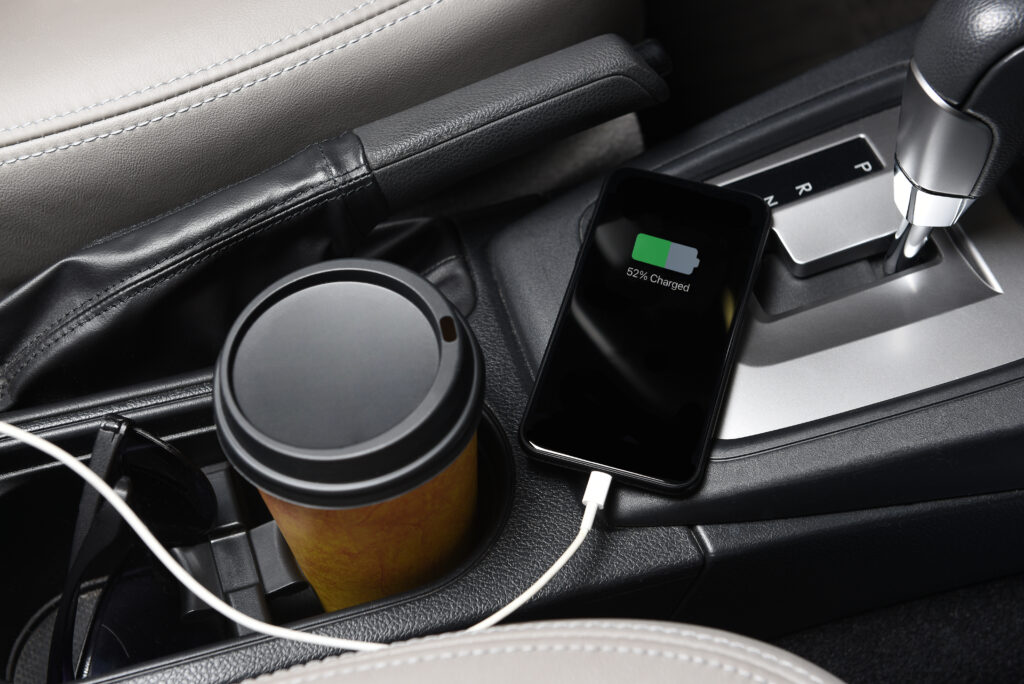
7. Reflective Triangle or Flares: These can alert other drivers if you find yourself stranded on the side of the road.

8. Blanket and Extra Clothing: In case you need to wait for help, staying warm is crucial. Keep an extra hoodie, warm gloves and a hat in the trunk.

9. Extra Bottle of Windshield Washer Fluid: It's hard to predict when you will run out. It's good to have extra on hand to refill on the go so you can maintain proper visibility.

10. Cash: A good item to include in your emergency kit. Keeping an extra $20 in your car can be a life saver if you run out of gas or need something and credit/debit machines aren't working

As a new teen driver, mastering winter driving skills is essential for your safety and the safety of those around you. By following these tips and keeping the recommended supplies in your car, you'll be better equipped to face the challenges of winter roads. Remember, your focus should always be on staying safe, even if it means taking things slow and steady when the winter weather takes center stage.
Note that these lists are not meant to be all-inclusive.
Spooktacular Safety: Ensuring a Safe Halloween
As the leaves turn and a chill fills the air, it can only mean one thing: Halloween is just around the corner! While the excitement of costumes and candy can be intoxicating, safety should always remain a top priority. In this article, we're bringing you a cauldron of safety tips to ensure a spooktacular and safe Halloween for all.
1. Costume Caution
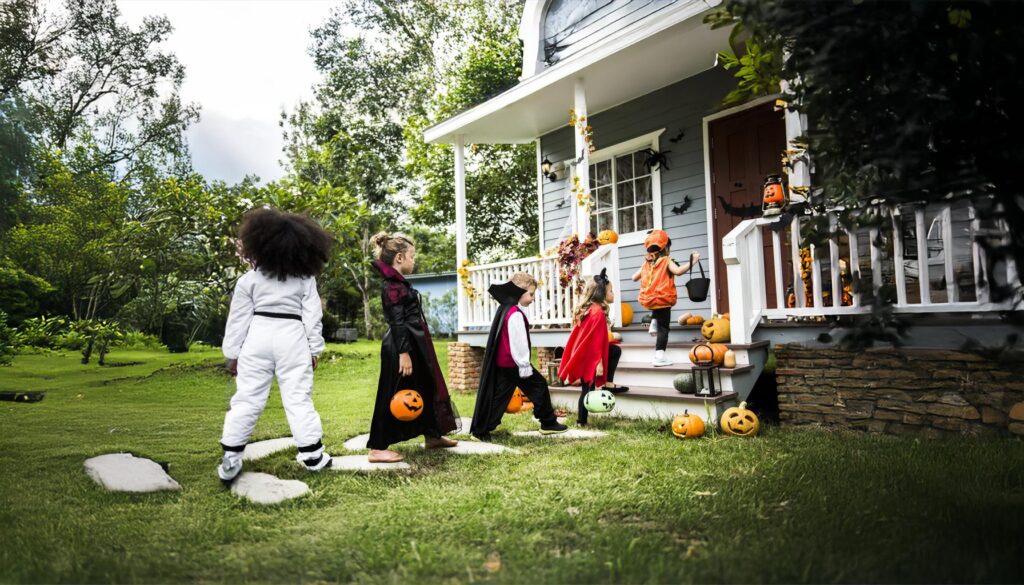
Creating the perfect costume is a Halloween tradition, but safety should never take a back seat to creativity:
- Visibility is Key: Choose costumes in bright colors or add reflective tape to ensure you're visible to drivers, especially in low-light conditions.
- Avoid Tripping Hazards: Opt for costumes that fit well and won't cause you to trip. Avoid long capes or trailing accessories that could lead to accidents.
- Comfort Matters: Make sure your costume is comfortable to wear, with proper ventilation and no obstructed vision.
2. Treats, Not Tricks
 The candy haul is a big part of Halloween fun, but it's essential to keep an eye on the treats:
The candy haul is a big part of Halloween fun, but it's essential to keep an eye on the treats:
- Inspect Candy: Examine all treats for signs of tampering or damage before digging in. Discard anything that looks suspicious.
- Allergen Awareness: If your child has food allergies, sort through the loot to remove any allergens before they dig in.
- Moderation is Magic: Enjoy the treats, but in moderation. Depending on the age of the kids, it may be best to limit access to the final candy haul.
3. Ghoulishly Good Time Outdoors
 Whether you're trick-or-treating or attending a Halloween event, outdoor safety is a must:
Whether you're trick-or-treating or attending a Halloween event, outdoor safety is a must:
- Adult Accompaniment: Younger children should always be accompanied by a responsible adult or older sibling.
- Stay on the Sidewalk: Stick to well-lit sidewalks and pathways, avoiding shortcuts through unfamiliar areas including walking between houses through lawns as there may be difficult to see hazards.
- Mind the Road: If you need to cross the street, use crosswalks and be sure to look both ways before stepping off the curb.
- Consider glow stick or LED light arm bands to increase visibility.
4. Home Sweet Haunted Home
 If you're welcoming trick-or-treaters to your own home, make sure you reduce hazards on your property.
If you're welcoming trick-or-treaters to your own home, make sure you reduce hazards on your property.
- Clear the Path: Keep your yard and walkway free of tripping hazards like decorations, cords, and debris.
- Well-Lit Ambiance: Illuminate your porch and walkway with ample lighting to guide visitors safely.
- Pet Safety: Keep pets secure and away from the front door to avoid accidental scares or bites.
5. Frightful Driving
 Motorists, too, need to take extra precautions during Halloween festivities:
Motorists, too, need to take extra precautions during Halloween festivities:
- Slow and Steady: Drive well below the speed limit in residential areas, and stay vigilant for excited trick-or-treaters.
- Avoid Distractions: Put away your phone and eliminate any distractions that might take your attention away from the road.
- Designated Driver: If you're attending an adult Halloween party, plan for a designated driver or alternative transportation.
6. Protect the Pets

- You may want to take your dog for a nice walk trick or treating but even if your dog is well behaved, you never know how other dogs will react when homeowners open the door.
- Keeping dogs home will limit risk of them being at additional risk.
- Likewise consider how many strangers will be visiting your front door. Secure your dog behind a gate or another floor so there is no risk of them running to the front door and attacking trick or treaters at the door.
Halloween should be all about laughter, creativity, and a little bit of harmless fright. By following these safety tips, you can reduce risks that can keep Halloween celebrations safe and truly memorable – for all the right reasons. So, whether you're donning a costume, giving out candy, or hitting the streets for some trick-or-treating, keep safety in mind and enjoy a ghoulishly good time!
Note that these lists are not meant to be all-inclusive.
Back to School Transitions: Tips for Entering College/University
Moving away to college or university can be a monumental step for many students. For many, this can be a time of great change, excitement and anxiety, both for parents and students.
Here are a few tips on how to manage your child’s transition to college or university as a parent.
Speak openly about finances ahead of time. It can be a stressful time for family finances and children may not know what to expect. Many students do not know what level of contribution you can make and where they may need to fill in the gaps through loans or part time employment. Making a plan together is beneficial in reducing potential stress as well as setting expectations for what kind of lifestyle they can expect while away at school. Highly encourage your kids to seek out grants and scholarships. There are vast opportunities to find additional financial resources to contribute to education. There are some very specific scholarships based on the student’s family status as well as personal, academic and athletic achievements. Fairly minimal effort can result in thousands of dollars of education contributions.
Take some time before the big move. Many students work summer jobs right until the last moment. If finances allow for it, encourage your child to take some time between work and school to spend time with their friends and family. Consider taking a day to spend as a family before your child moves doing a fun activity. Students also part with longtime friends or perhaps a significant other with a college move, so encouraging them to spend extra time with the important people in their lives can be very meaningful.
Try to setup a regular time to keep in touch. How often you communicate will depend greatly on your relationship with your child. It’s nice to set aside a specific time to call or video chat just to keep in touch. Keep in mind that their schedules will change over the course of the school year with time periods that are more stressful, and time periods where they may lead a more active social life. Understand that some students are more independent and may not chat as often. Conversely some students struggle quite a bit while away. For students who struggle with home sickness, being away from family, friends or their significant others more frequent check-ins can be very valuable to them.
Encourage participation. There are endless opportunities for students to get involved in campus activities. Really try to encourage students to get involved in social clubs, but also find opportunities for personal and professional development. Many students realize after the fact that some of their most valuable networking and education takes place outside of the class room.
Consider adjusting at-home expectations. Many students don’t move away and go to school in their home town. For some families this is a struggle as students want to participate with their peers and may desire to adjust their lifestyle to something different than their high school days. Many parents struggle with this as they still see it as kids living under their roof and following their rules. Previously in-place norms such as curfews may be reconsidered and discussed to ensure everyone is aware of expectations. Ultimately, open communication and stating your expectations, while also listening to their concerns will lead to the least potential conflict.
Encourage exploration. Many students opt to move to a new city which offers a bounty of new opportunities and places to explore. When visiting them, considering getting off campus, exploring local sites and attractions. The benefit of living in a new place is taking in everything that a new city has to offer including sporting venues, museums, parks, hiking trails, etc.
Model healthy habits. It’s easy for students to quickly develop unhealthy habits with nutrition and exercise. There’s no question your kids are going to have late night pizza, all-nighters and binging on caffeine or other stimulating drinks. Recognize it’s going to happen and be open and honest with your kids. Encourage them to seek a balance and understand they will make unhealthy choices sometimes. Consider buying them a gym membership close to campus to stay active.
Speak openly about mental health. In this day and age there is a significant rise in mental health issues on campus. Anxiety is particularly prominent on campus with all the pressures students are feeling. If your child expresses concern listen openly, offer direction to resources on campus if that is helpful. Be careful about being a “helicopter parent” however. Post-secondary institutions have indicated that some students struggle with being self-reliant. Many of these students become adult age while at college and university so as much as it’s important to provide assistance and guidance, it can also be beneficial for them to learn to figure things out on their own.
Learn to let go… a little bit. For many parents it’s difficult to let go and not be involved in every part of their child’s life. Going off to school, particularly if students live in dormitories is the perfect opportunity for students to learn some valuable life lessons in a safe environment. They are able to make mistakes while learning and growing. It’s an incredible period of self-discovery and learning who they truly are.
Consider Student Accident Insurance. New environments and situations introduce new risk and having Student Accident Insurance provides greater peace of mind. Accidents can introduce financial burdens during an already financially stressful time. Feel secure knowing your family is protected from the financial impact if your child is involved in an accident. Learn more about available plans here.
You may have noticed many of the paragraphs began with “speak openly” and “encourage”. This is a pivotal transition in many students’ lives to adulthood and it’s a great opportunity to instill parental wisdom, while giving them the opportunity to grow in their own direction. They will make mistakes, they will struggle, but that is how they will learn.
Now you’re left with important questions such as… do you turn their old bedroom into a gym? A study?
Back to School Transitions: Tips for Entering High School
Going into high school is a huge change for a lot of students. Not only is their educational and social life changing, they are experiencing a great deal of personal changes in the coming months and years.
One thing you can do as a parent is build a relationship of trust and open communication. Many kids will begin pulling away from parent/child relationships and growing closer to their peers. You have the opportunity to grow your relationship positively by being open while also giving them space and privacy. Let them know they can always come to you. Listen to their concerns and maintain an interest in what is going on in their life.
Here are a few tips on how to manage this exciting transition and potentially stressful time as a parent.
Encourage them to step outside their comfort zone. Students entering high school come from numerous schools from all over the region. It’s a great opportunity to meet new people. Encourage them to welcome others into their circle of friends. It could mean a lot to individuals who don’t have an established group of friends at their new school.
Avoid judgement of personal and lifestyle choices. They might begin to dress differently, act differently, and hang out with different friends. You want to carefully approach how you discuss their choices. Certain choices such as adopting “strange” clothing can be just a phase. You want to avoid putting up potential communication barriers with your child if they feel they are being judged. This is a sensitive time when they are trying to figure out who they are as a person.
Clearly communicate boundaries and expectations. As they mature into adolescence they have an opportunity to earn more responsibility and freedom. Those newly earned freedoms still require some boundaries. Establishing rules and expectations ahead of time and ensuring there is an understanding of those expectations helps in reducing conflict.
Encourage them to get involved in clubs and athletics. Not only is this a great way for them to meet friends with mutual interests, but it also begins to build out their experience and resume. So much learning takes place outside of the classroom. Participating in those extracurricular activities can assist in building self-esteem and team work skills while building their knowledge and skills in specialized areas.
Don’t overload their schedule. It’s tempting to get your kids involved in every possible activity, sports team, music lessons, etc. They also need time to just socialize, or even decompress by themselves. The time demands for high school students can be quite strenuous so a school-life balance is important.
“The Digital Talk” – As a parent there are a lot of tough conversations to have. One that parents have to deal with now that wasn’t a concern in their youth is the topic of posting online and the potential consequences of certain activity. It is critical to communicate the risks of sharing or posting certain photos, text messages or posts online. At a younger age they may not understand the ramifications of posting and sharing certain things that could impact future employment opportunities as well as their personal reputations. There is also risk of bullying from things that are shared between friends. It is best to assume once it is online, it is there forever, for anyone to see.
Consider device monitoring software and parental control apps. This choice will be different in every family and you may have a different stance on what level of privacy you want to give your child at different ages. Some parents want to know everything that is happening under their roof and want to keep a close eye on their child’s communication. There are lots of options for apps that block content, control screen time or monitor GPS location.
Consider Student Accident Insurance. New environments, activities and situations introduce new risk and having Student Accident Insurance provides greater peace of mind. Accidents can introduce financial burdens during an already stressful time. Feel secure knowing your family is protected from the financial impact if your child is involved in an accident.
We offer a variety of plans to suit every family’s needs. Explore available plans here.
Back to School Transitions: Tips for Starting Kindergarten
They’re growing up so fast! Kindergarten already!? The Back to School season, particularly starting kindergarten, can be an exciting and stressful time for families. It can be a big adjustment, not just for your child going to school but for your family and other children in the household.
Here are a few tips on how to manage the transition to kindergarten during this exciting and scary time as a parent and student.
Take in the moment. It’s one of those significant life milestones. If possible, consider taking the morning off work to see your child off. Usual mornings can be chaos with getting yourself and your kids ready. Give yourself extra time, make a special breakfast and try to take in the moment without worrying about rushing out the door.
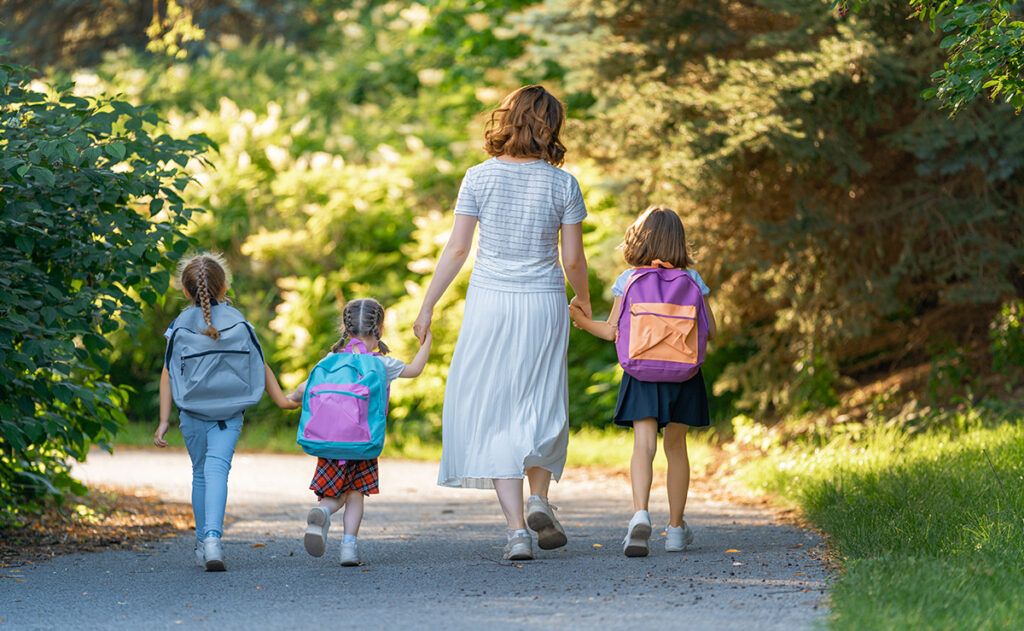
Plan ahead. Help your child pick out and prepare their outfit/uniform for the morning. Prepare lunches and back packs to remove things that can cause stress the next morning.
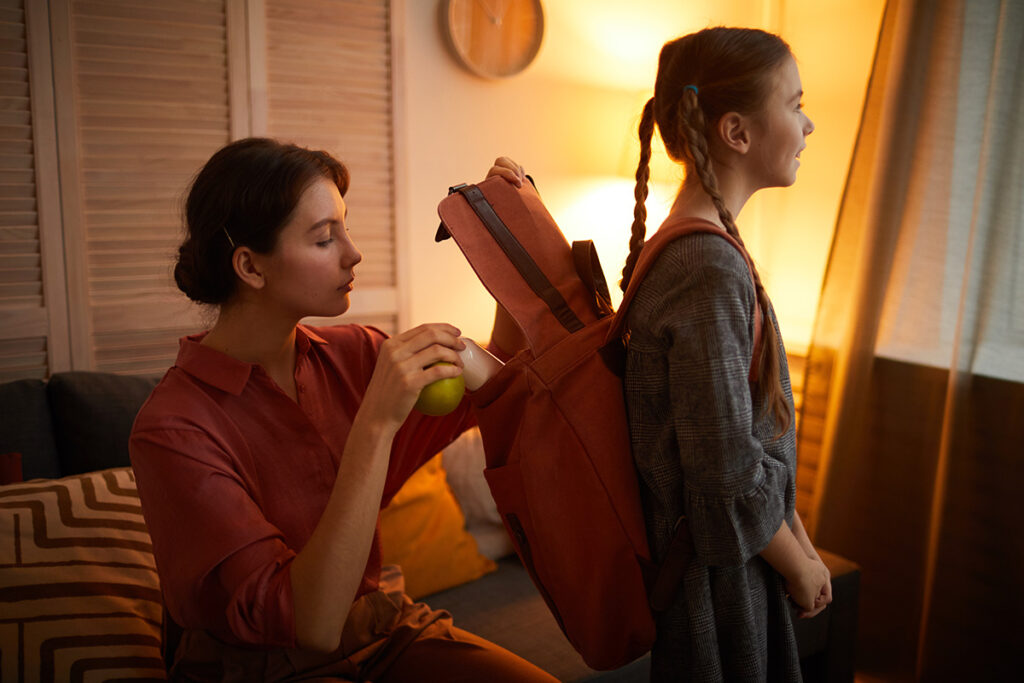
Capture the moment, but share with caution. Definitely document this big day with some special pictures but be careful about posting them online. Many parents love to share milestone moments online with friends and family. The classic first day of school picture is always a fun one to share. Carefully consider how much information you share inadvertently. These posts can reveal a shocking amount of information you may not want out in the public eye.
Photos in front of houses or on your street can reveal house numbers, street signs. Your post may indicate the school name or where bus drop-offs are. Some parents purchase fun signs that realistically contain a dossier of information about your child.
Additionally, photos may be posted with geo-information embedded in the photo’s metadata that allows someone to see exactly where photos are taken. Some parents are more open than others about sharing information online but it is important to consider how much sensitive information you are potentially revealing publicly. Carefully consider the wishes of fellow parents. Your child may have a friend whose parent does not want their photo shared that indicates their name or what school they attend.
Ultimately it’s your decision what you post online but be aware of how easily very personal information can be seen by a stranger.
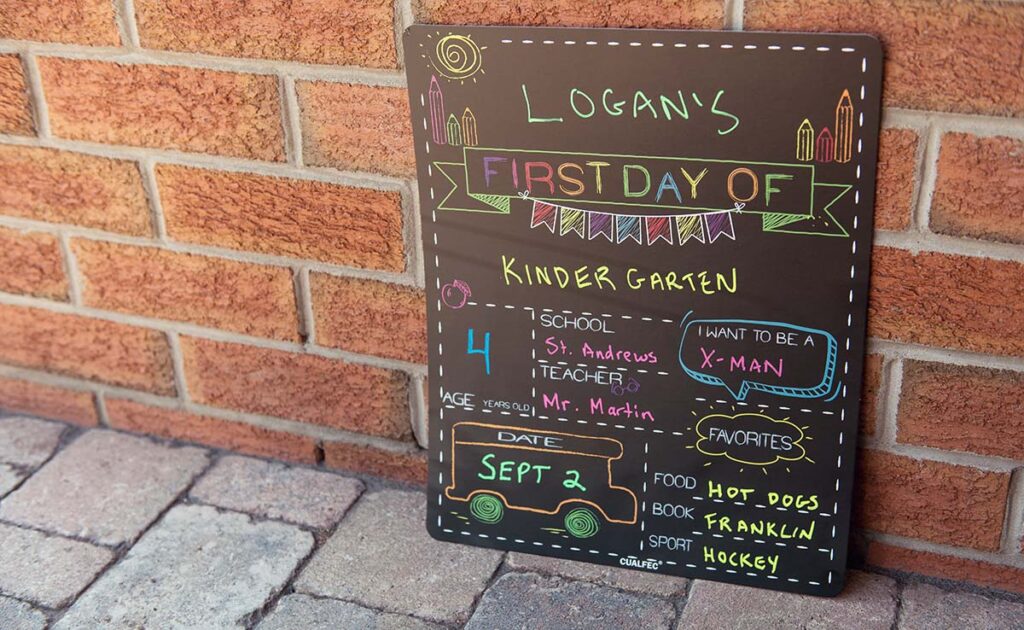
Create an emergency plan. Things happen in our lives where a student may need to be picked up from school. Assign specific people to pick up your kids and discuss with them who might pick them up. Consider creating a code word with them for anyone that may pick them up for any reason. Discuss your weekly plans openly with your kids so they know what to expect so they can question if a change has been made.
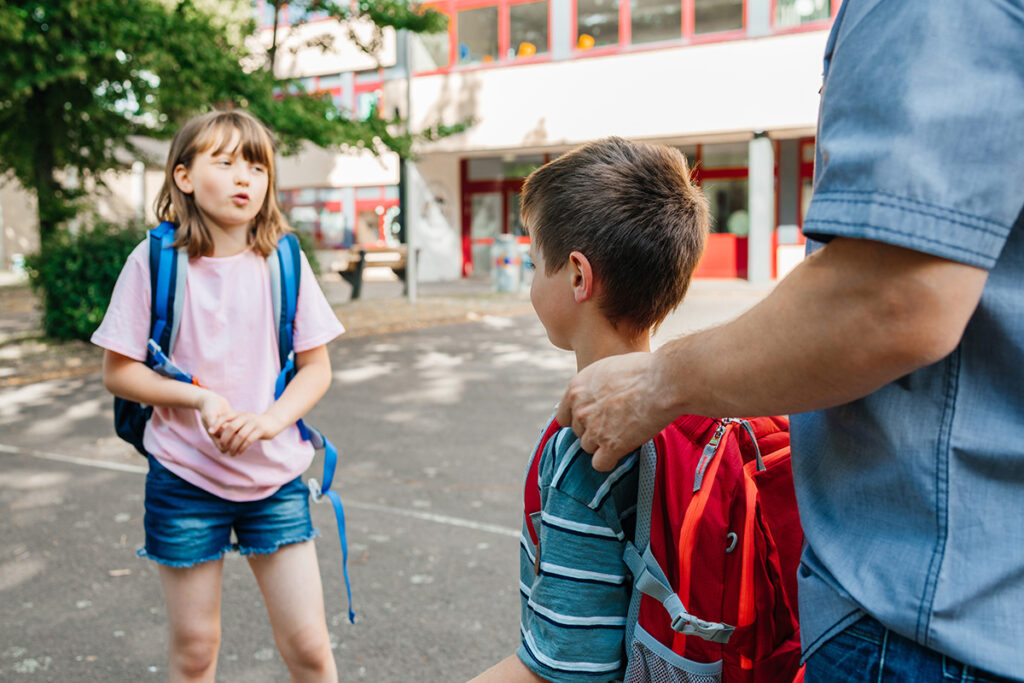
Check with your school for restrictions and allergy information. Different school boards and individual schools may have specific rules when it comes to things such as litterless lunches or items restricted due to allergy concerns for other students.
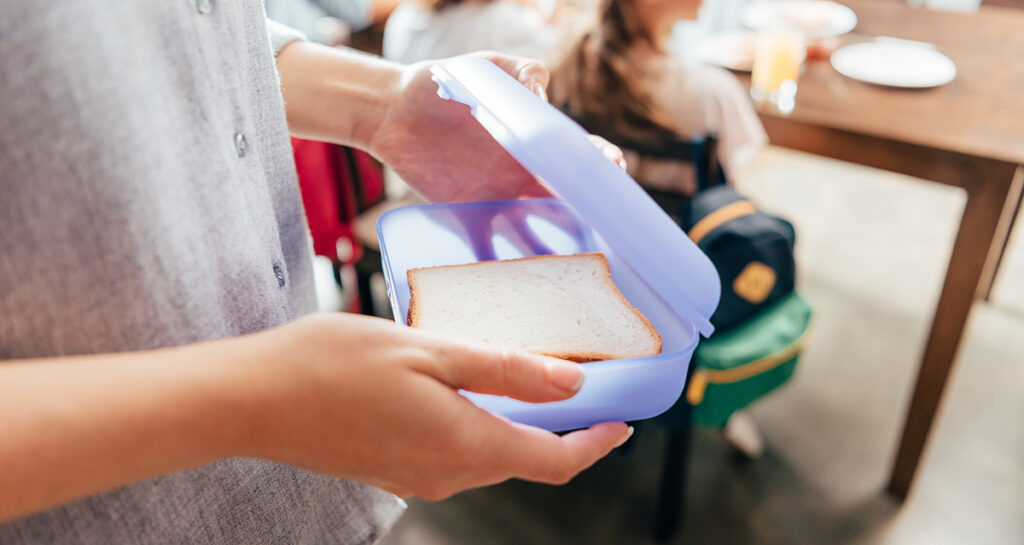
Have your children assist with packing their lunch and snacks. Having your child participate in preparing their food has been shown to reduce food waste as they are involved in the decision making of what they will be eating.
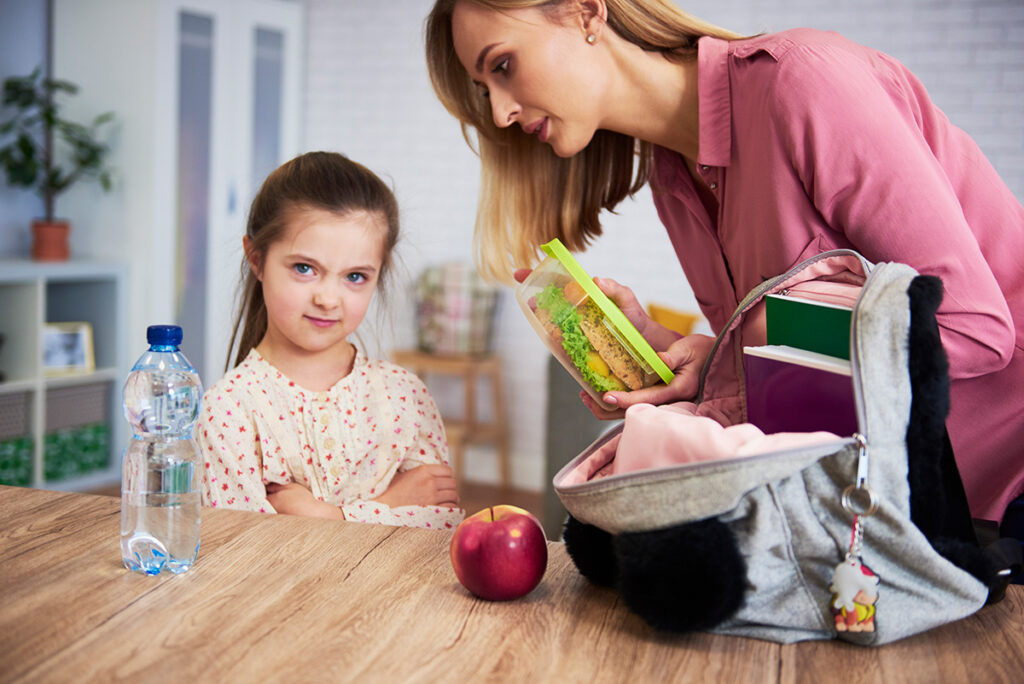
Buy appropriate footwear. Schools may have some requirements for footwear in terms of dress codes and uniforms but consider comfort and utility where possible. Ideally the child can put the shoes on themselves, but also they should be comfortable, appropriate to weather and have good grip to avoid trips and falls.
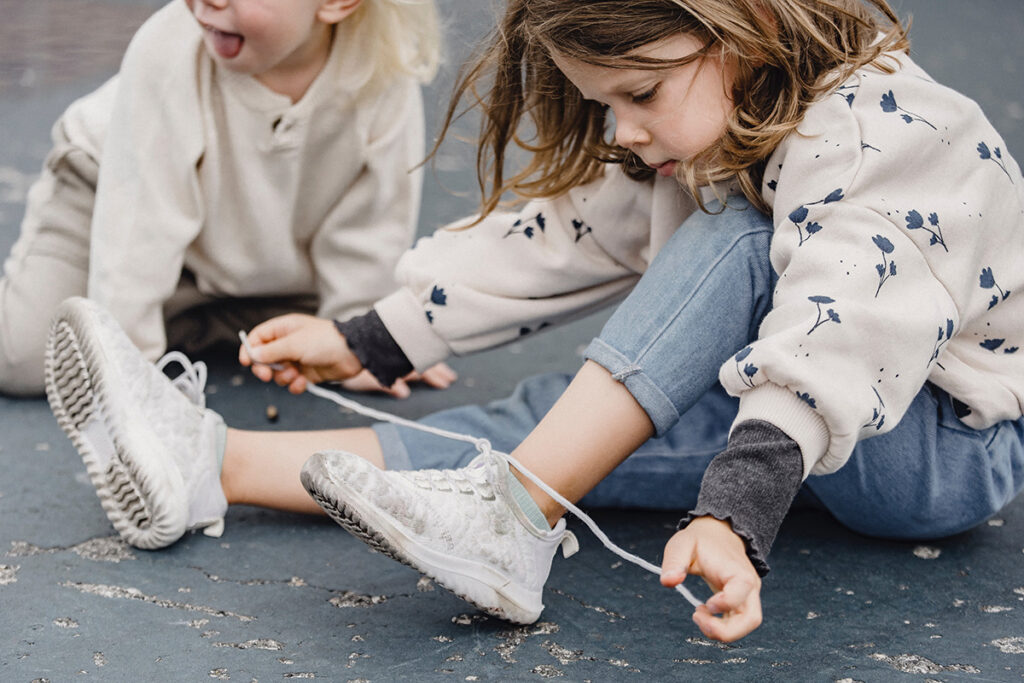
Try to adjust schedules the week or two before school starts. Starting school can be a significant change to your family’s daily schedule and the sudden change can result in some rough mornings. Trying to adjust bedtimes and meal times to their new normal schedule will help ease the transition.

Visit the School. Most schools will have an orientation or open house that will give you the opportunity to see the classrooms and meet teachers. It also gives your child the opportunity to get familiar with the space, learn about the daily schedule and start getting a sense of the expectations. They can also meet some potential future friends.

Label everything you can. Many companies offer durable custom labels that can be used on anything from lunchboxes to shoes. Lots of kids will have the same clothing items, accessories, water bottles and can easily get mixed up.
Build excitement leading up school starting. Shop together for school supplies, pick out a special outfit and continue speaking positively about school leading up to the school year. The morning of, don’t share your own anxieties or nervousness as they may pick up on that.

Communicate the plan for the day. Let them know what will happen when sending them off to school, their schedule throughout the day, and the plan for their return home. For many kids, their world is pretty small. Starting at a new school can be a complete upheaval to their lifestyle. Being open about what will happen and when can help ease anxieties.

Consider Student Accident Insurance. New environments and situations introduce new risk and having Student Accident Insurance provides greater peace of mind. Accidents can introduce financial burdens during an already stressful time. Feel secure knowing your family is protected from the financial impact if your child is involved in an accident.
We offer a variety of plans to suit every family’s needs. Explore available plans here.





